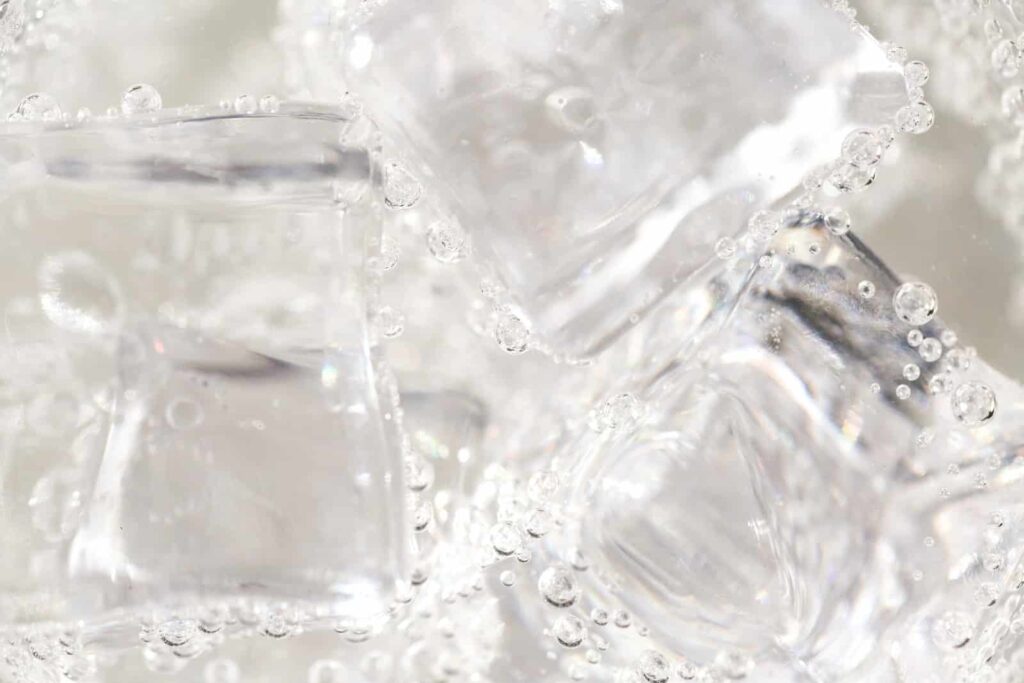When objects freeze or transform from a liquid to a solid, they usually shrink or get smaller.
This is because, generally, making anything hotter causes it to vibrate further. When it vibrates further, it takes up more energy and hence expands.
So, theoretically, cooling something causes the particles to travel more slowly, clash and bounce off each other less intensely and less often, and therefore spend more time near together, causing the substance to shrink.

On the other hand, ice is very peculiar in that it stretches or becomes bigger when it becomes warmer, beyond the fact that the particles are likely vibrating less for the reasons explained above.
This is because of the unusual form of water molecules.
The Molecular Point of View
The water molecule, made up of two hydrogen atoms and one oxygen atom, has a Mickey Mouse head-like shape, with the hydrogen atoms representing the ears and the oxygen atom representing the head.
The oxygen atoms on one side of the molecule have a slight negative charge, while the hydrogen atoms on the other have a slight positive charge.
As a result, the water molecules are pulled together, creating hydrogen bonds. As water freezes, the molecules organize themselves in a very open structure that takes up more room than water in its liquid state.
Therefore, when water freezes, it expands and becomes less thick. On the other side, unlike most other liquids, it expands until thawed.
When water freezes, how can it expand?
Air, in particular, exhibits the natural behavior of contracting due to cooling up to 4° C. However, it begins to increase in length when cooled to temperatures below that. This is because, as previously said, the molecules begin to form a stable hexagonal lattice framework. It has a large intermolecular space and is a rather open structure.
As a result, the expansion. The same is true as it eventually freezes to ice at 0° C.
Is water the only thing that expands when frozen?
No, it’s not such a substance examples include plutonium, germanium, bismuth, gallium, silicon, and acetic acid, among others.
Does alcohol expand more than water?
The temperature of a specified volume of alcohol and the same volume of water is raised from room temperature to the same temperature. Since the coefficient of expansion of alcohol is greater than that of water, alcohol spreads rather than water.
Is it possible to prevent water from spreading as it freezes?
Yes, under pressure. There is currently no substance on Earth that can contain the strength of expanding ice boy.
When a substance is frozen, it does not grow.
Water spreads as it freezes when liquid is at or above room temperature, say 0 to 100 C. Solid hydrocarbons and alcohols take up less space than liquid hydrocarbons and alcohols.
Any metals stretch as they freeze. If I remember right, these include antimony and bismuth.
Gallium melts at about 30 degrees Celsius, meaning it is molten at room temperature. I believe that certain gallium isotopes are liquid at lower temperatures. The alloys must be shipped in containers with headspace to avoid failure if the temperature decreases and the liquid metal freezes.

Jay
Jay is a health and wellness enthusiast with expertise in water quality and nutrition. As a knowledgeable advocate for holistic well-being, Jay successfully manages Type 2 Diabetes through informed lifestyle choices. Committed to sharing reliable and authoritative insights, Jay combines firsthand experience with a passion for enhancing health."

